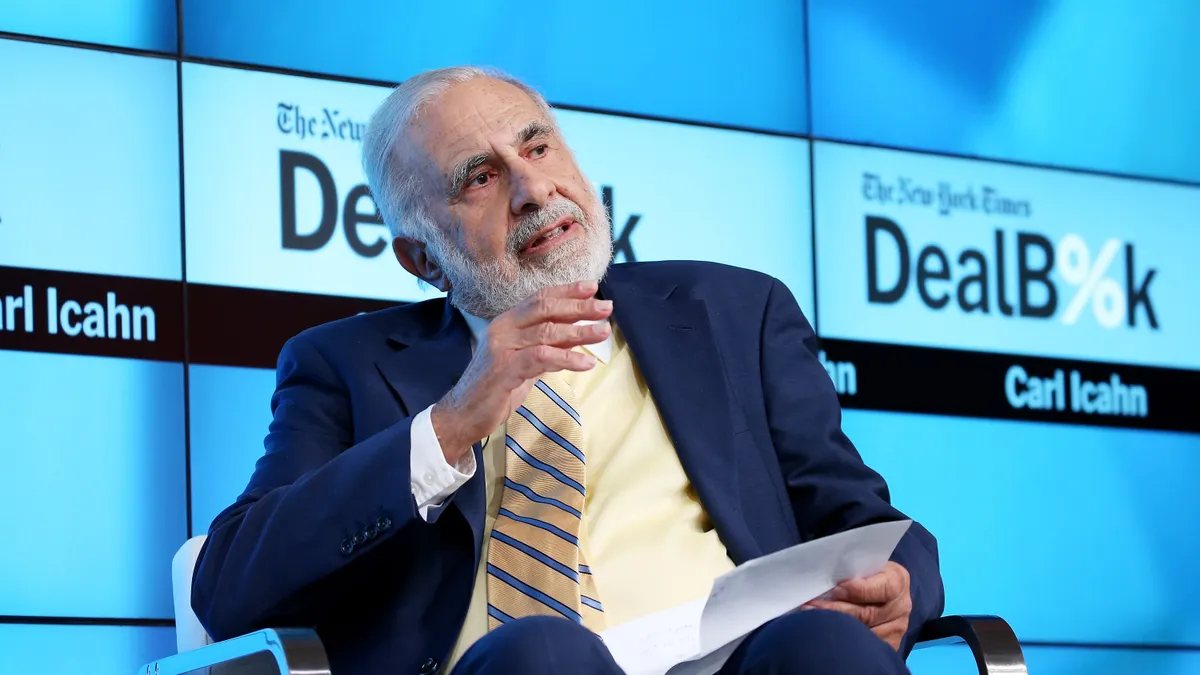Carl Icahn, a billionaire investor and so-called corporate raider, is often at odds with regulators when he attempts to turn profits from what he regards as undervalued companies. However, this time both Icahn and antitrust regulators in Europe and the U.S. are pursuing the same goal: to force the DNA-sequencing company Illumina to sell or spin off Grail, a liquid biopsy company that makes tests for cancer.
Icahn seeks to increase the value of a recently acquired stake in Illumina, while the regulators want to boost competition in the emerging world of cancer diagnostics. As pressure mounts on Illumina, which acquired Grail two years ago in defiance of those regulators, the question now may be not if, but when the company will yield, analysts say.
The U.S. Federal Trade Commission reversed on Monday an administrative law judge’s decision to dismiss antitrust charges initially brought in a complaint by FTC staff. Illumina immediately vowed to appeal the FTC opinion.
The San Diego-based company also is appealing the European Commission’s challenge to the Grail purchase. A final decision from the commission could come at any time, though some analysts have projected that both cases may not be decided until late this year or early 2024.
Illumina has said it will divest Grail if the commission orders it do so, to comply with the forthcoming final decision, and investors believe a divestiture is inevitable, according to analysts.
So why not, as Icahn is demanding, begin the process of divesting the asset now and avoid prolonging what may be the inevitable?
“The reason for the appeal is to give management some time to wait for data that could validate Grail’s key technology, and also to have a better market to sell/spin the asset,” Barclays analyst Luke Sergott told MedTech Dive in an email.
Icahn pointed out when he proposed to seat three of his associates on Illumina’s nine-member board that the stock sell-off that followed the closing of the Grail deal wiped out $50 billion in shareholder value and was a clear show of investor disillusion.
“This value destruction is a direct result of a series of ill-advised (and frankly inexplicable) actions taken by the board of directors of our company in connection with the acquisition of GRAIL,” Icahn said in the proposal.
Illumina’s move to close the deal without waiting for the green light from regulators now may result in the maker of sequencing platforms being forced to unravel the acquisition. Icahn is pushing for Grail to be divested without delay to avoid what he expects could be multiplying financial penalties.
“Most investors already believed that Illumina was going to have to do this anyway,” Sergott said. The company’s shares have recovered almost 19% of their value since Icahn’s proxy challenge was unveiled.
The FTC’s decision bolsters Icahn’s case to fellow shareholders, according to J.P. Morgan analyst Julia Qin.
“The FTC order adds to the regulatory headwind Illumina faces, as it’ll now appeal both in the U.S. and in Europe. This further strengthens Icahn’s proposal of immediate divestiture of Grail,” Qin said in an email.
Icahn also suggested in an interview last week with the Wall Street Journal that Illumina should bring back former CEO Jay Flatley to replace current CEO Francis deSouza, who oversaw the purchase of Grail, which Illumina spun off in 2015. Flatley previously suggested that Illumina overpaid for Grail, a sentiment with which Icahn has agreed.
Illumina is urging shareholders to reject Icahn’s director nominees.
”By adding Icahn's director nominees, who lack experience in, and knowledge of, the business and industry, Illumina risks jeopardizing the long-term success of its core franchise which is primed to achieve rich, long-term shareholder returns over the next several years and beyond,” Illumina said in a statement last month.
Grail’s blood test, called Galleri, screens for 50 types of cancer from a single blood draw. Grail is ahead of a pack of companies racing to bring similar multi-cancer detection tests to market. Illumina maintains it has the resources to drive reimbursement and broader adoption for the Grail test, ultimately saving more lives.
Still, antitrust regulators in both the U.S. and Europe have voiced concerns that the genomics company’s control of Grail could have the opposite effect.
Instead of revolutionizing the fight against cancer, the merger may instead deter competition in the nascent market for blood-based early-cancer tests, European Commission officials contend. That’s because the sequencing systems maker supplies the market with technology used to develop and process the tests, and owning Grail, they have said, creates an incentive to limit rivals’ access.
As for a future without Grail, “we think Illumina’s business is the most transformative invention in our generation,” Sergott said. “Move over internet — we believe the net gains to society from sequencing will far outweigh those of the internet.”
Morningstar analyst Julie Utterback said Illumina’s investments in Grail are cutting into the company’s near-term earnings. As for the longer term, there is “significant uncertainty” about cash flows for the liquid biopsy business, she added.
“Icahn appears to want Illumina to divest Grail in order to eliminate those ongoing investments,” Utterback said in an email.
Whether Icahn can garner support from other shareholders for his board nominees is unclear. Proxy fights are rare in the life sciences tools industry, TD Cowen analysts said in a recent report. Academic research on activist cases shows success in winning board seats in about one-third of such battles, the report said.
In two-thirds of the contests, nominations occurred through a settlement between the board and the activist rather than a full shareholder vote. Under the settlement scenario, Icahn has a “reasonable” chance of gaining one or two seats, analyst Dan Brennan said in the report.
At the same time, Icahn owns just 1.4% of Illumina’s shares and his three nominees lack experience in the life sciences field, TD Cowen said. These factors could work against the financier’s efforts, the report said. In addition, Illumina has provided more detail in recent months about potentially divesting Grail.
“Hence, would new nominees accelerate it much?” Brennan asked.
Still, Illumina’s decision to close the Grail deal before securing regulatory approval could be viewed by shareholders as enough reason to support Icahn’s agenda, analysts said.
Investors now are scrutinizing the current board’s decision to back the acquisition over regulators’ objections.
“The legitimacy of the board is at stake here,” said Canaccord Genuity analyst Kyle Mikson, who also believes Icahn could gain one or two board seats.
Both sides will try to convince shareholders over the next two months that their position is the best path forward for Illumina, Mikson added.
“From right now until the annual meeting of shareholders, which is probably going to be late May, the plan for the company and for Icahn is basically to market their pitch to investors,” Mikson said. “They’ll do a ton of presentations and investor outreach as well.”
The rally in Illumina’s shares after Icahn highlighted his interest in the company suggests investors may be ready for a change, Morningstar’s Utterback said. “Illumina’s management team has delivered underwhelming financial results in the past year or so. So there may be some support from current investors, but we’ll just have to wait and see how much support.”
Regulators’ divestiture orders will be subject to the ongoing appeals processes, Utterback added, “but we suspect it may be possible for Illumina to spin off Grail in a tax-free manner to shareholders, like we are seeing at so many other firms right now.”


















